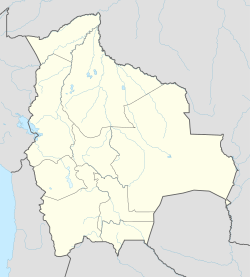Charazani or Charasani is a small town in the South American Andes in Bolivia.
Charazani
Charasani | |
|---|---|
 Charazani | |
| Coordinates: 15°10′38″S 68°59′18″W / 15.17722°S 68.98833°W | |
| Country | |
| Department | La Paz Department |
| Province | Bautista Saavedra Province |
| Elevation | 10,500 ft (3,200 m) |
| Population (2001)census | |
| • Total | 501 |
| Time zone | UTC-4 (BOT) |
| Climate | Cwb |
Location
editCharazani is the capital of Bautista Saavedra Province and central town of the municipality. It is situated on a spur at an elevation of 3,200 m amsl between Cordillera Muñecas in the south and Cordillera Apolabamba in the north, on a Mapiri River tributary which itself flows towards Beni River.
Infrastructure
editCharazani is located 254 km north-west of La Paz, the capital of La Paz Department. From La Paz, the asphaltic highway Ruta 2 goes 70 km north-west to Huarina, where the asphaltic Ruta 16 branches south-west for another 97 km along Lake Titicaca till Escoma. From Escoma a dirt road goes north and reaches Charazani after 87 km.
The weekly village market attracts vendors and visitors from a wide area. The market makes Charazani economically the most significant locality in the Charazani valley.[1]
Population
editThe population of Charazani has risen by 20% in the recent decade, from 501 inhabitants (2001 census)[2] to 604 inhabitants (2008 est.). Currently, La Paz's Gobernación shows that Charazani has 11 761 inhabitants in the whole municipality. Most inhabitants of the Charazani municipality live in poverty: 91,5% of the municipality are unable to suffice their basic needs.
It boasts of a population that speaks Quechua, which is also learned at school. About 76.5% of the municipality speak Quechua as a primary language followed by Aymara speakers, 13%.
Charazani is a major locality for the Kallawaya, a UNESCO Intangible Cultural Heritage culture of ritualistic healers.
Climate
edit| Climate data for Charazani | |||||||||||||
|---|---|---|---|---|---|---|---|---|---|---|---|---|---|
| Month | Jan | Feb | Mar | Apr | May | Jun | Jul | Aug | Sep | Oct | Nov | Dec | Year |
| Mean daily maximum °C (°F) | 18.1 (64.6) |
18.0 (64.4) |
18.2 (64.8) |
18.6 (65.5) |
17.9 (64.2) |
18.1 (64.6) |
18.3 (64.9) |
19.3 (66.7) |
19.3 (66.7) |
19.7 (67.5) |
20.0 (68.0) |
18.7 (65.7) |
18.7 (65.6) |
| Mean daily minimum °C (°F) | 8.3 (46.9) |
8.6 (47.5) |
8.4 (47.1) |
6.8 (44.2) |
4.6 (40.3) |
2.9 (37.2) |
3.6 (38.5) |
4.5 (40.1) |
6.1 (43.0) |
7.3 (45.1) |
7.9 (46.2) |
8.5 (47.3) |
6.5 (43.6) |
| Average precipitation mm (inches) | 76 (3.0) |
72 (2.8) |
50 (2.0) |
31 (1.2) |
13 (0.5) |
9 (0.4) |
8 (0.3) |
10 (0.4) |
26 (1.0) |
29 (1.1) |
30 (1.2) |
45 (1.8) |
399 (15.7) |
| Source 1: Dirección General de Riego Vice Ministerio de Desarrollo Rural y Riego[3] | |||||||||||||
| Source 2: National Meteorology and Hydrology Service of Peru (precipitation)[4] | |||||||||||||
References
edit- ^ Schoop, Wolfgang (1982). "Güteraustausch und regionale Mobilität im Kallawaya-Tal (Bolivien)". Erdkunde. 36 (4). doi:10.3112/erdkunde.1982.04.03. ISSN 0014-0015.
- ^ Observatorio Bolivia Democrática[permanent dead link]
- ^ "Abro Charazani PDF". Dirección General de Riego Vice Ministerio de Desarrollo Rural y Riego. Retrieved 11 June 2024.
- ^ "anexos atlas climatico" (PDF). National Meteorology and Hydrology Service of Peru. Retrieved 13 June 2024.
